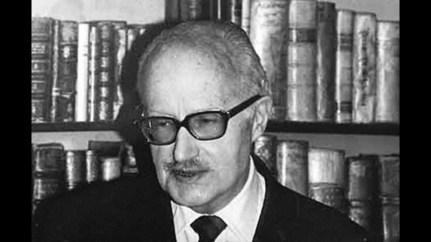Christophe Boutin is a professor of public law at the University of Caen, he co-directed with Frédéric Rouvillois and Olivier Dard the
Dictionary of Conservatism and Dictionary of Populisms
(editions du Cerf)
.
If there are authors whose name constitutes a password between insiders, the Colombian Gómez Dávila (1913-1994) and most certainly of them.
His work, which has only been partially translated, is still poorly known in France, and we must be pleased that Michaël Rabier offers us his intellectual biography in a very rich work: Michaël Rabier,
Nicolás Gómez Dávila , thinker of anti-modernity.
Life, work and philosophy
, Paris, L'Harmattan, coll.
Théôria, 2020.
Let us first fix some quick elements of a very little agitated biography.
Born in 1913 into a wealthy Colombian family, Nicolás Gómez Dávila came to live with his parents in France in 1919 and stayed there until he was twenty, hence an undeniable cultural influence.
When he got home he married, had three children, and lived on his income, refusing all the positions offered to him to remain largely cloistered in his library with 30,000 volumes.
From 1954, he edited for his friends some of his aphorisms, a writing work aimed at bringing the subject back to the essential in a very pure sentence, inscribing itself in a lineage which undoubtedly refers to French moralists, but even more in Montaigne, whom he admires.
It was not until 1977 that he published the first two collections intended for distribution of his
Scholies for an implicit text
, followed by two other collections of
Nouvelles scholies for an implicit text
(1986) and finally that of the
successive Scholies for an implicit text
(1992), five volumes in all, to which can be added a text on law, justice and the state published in 1988,
De jure
, and a posthumous text,
Le reactionionnaire authentic
(1995).
In France, two volumes of selected scholies have appeared in the Rocher editions,
Les horreurs de la democratie
(2003) and
Le Réactionionnaire Authentique
(2005), and a third in L'Arche editions,
Les carnets d'un vaincu
(2008). .
Five main volumes therefore, with more than 10,000 aphorisms published over twenty-five years, but which Michaël Rabier precisely shows us the consistency.
The “
nodal point
” of Gómez Dávila's thought, he writes,
“seems to lie in a questioning of modernity”
.
The form chosen itself would be meaningful: if the Colombian retains the term
scholies
instead of that of
aphorisms
,
"it is to situate himself in the tradition of ancient and especially medieval commentators"
.
But to comment which “
implicit text
”?
Rabier evokes the hypotheses of certain readers, according to which Gómez Dávila would thus build, step by step, through a pointillism that he claims, a critique of democracy understood as an anthropocentric religion.
But the biographer chooses to go further, wondering whether, in view of this library in which the Colombian author will have chosen to spend the greater part of his life, the "
implicit book
" thus commented on would not be the whole. of his readings, which is a significant part of Western cultural tradition.
If there are authors whose name constitutes a password between insiders, the Colombian Gómez Dávila and most certainly of these
Christophe Boutin
Coming back to the choice of form, Rabier provides a fascinating reading grid.
According to him, it would be the same for Gómez Dávila as for Nietzsche:
"the privilege granted to the aphorism consists much more than an aesthetic choice, but expresses a thought experience, a philosophical way of living"
.
Like Socrates with his questions, the Colombian, by using this brief form, would indeed push his reader to discover for himself, thanks to this questioning, a philosophical or socio-political truth, instead of seeing it taught, otherwise imposed, in a test.
A method that necessarily produces different effects depending on the culture already possessed by the one who will thus be confronted with the aphorism, but this elitism is perfectly assumed by Gómez Dávila, whose scholies are sometimes decorated with direct quotes, but also disguised, fully understandable then only by those of his readers who already share the same knowledge with him.
Nietzsche, Cioran or Gustave Thibon also used this direct form of attack, this way of provoking the reader.
"To
accuse the aphorism of expressing only a part of the truth is equivalent to supposing that the verbose speech can express it in its entirety
", writes the Colombian, who adds
: "The idea that does not win in twenty lines does not not win in a thousand pages. "
For him, the truth does not arise from a demonstration, but from the direct confrontation with a question, and
"philosophy is the art of formulating problems lucidly.
Inventing solutions - he concludes - is not an occupation of serious intelligences ”.
Philosophy here is indeed a way of life - if not an art of living - which must be considered on a daily basis and make it possible to fight against this modernity which is destroying man.
It must be a spiritual exercise that concludes this sober writing which helps to clarify the thought and transforms it into a weapon.
"
Perfecting insolence
", the Colombian wants to be a guerrilla:
"We must shoot, from any thicket, on any modern idea, advancing alone on the path"
.
Lover of this style, Gómez Dávila even praised the sarcasm and the audacity of the French philosophers of the 18th century, who nevertheless largely contributed to destroying the traditional society which he defends, but of which he appreciates the sharp thought, regretting that such weapons are hardly used nowadays against triumphant modernity.
But nowadays more than ever
“originality needs to lean on the continuity of a tradition”
, because without the latter, it is only destruction.
We understand that according to the Colombian tradition, “
heritage of life
”, is anything but a closed system - didn't Maurras write that
“true tradition is critical”
?
Philosophy is here a way of living - if not an art of living - which must be thought of on a daily basis and make it possible to fight against this modernity which destroys man
Christophe Boutin
What then are the characteristics of this modernity that Gómez Dávila challenges?
The first reproach that he makes him is to have made disappear the gods (and it is indeed of a plural that uses this catholic) and thus allowed the return of the titans, fall in a Promethean vision which would rest for our author on a certain number of Christian heresies: Arianism and Gnosticism are thus for him essential elements of this modern state of mind - and Michaël Rabier devotes on this point many very instructive pages to the comparison between the thought of Gómez Dávila and that of Eric Voegelin.
Heresies to which the Colombian adds, perhaps more surprisingly for some readers, a stoicism which remains for him
“the cradle of all errors […]: deification of man, determinism, natural law, egalitarianism, cosmopolitanism, etc ”
.
"Modern times have as their task the realization and humanization of God,
writes Gómez Dávila -
the transformation and resolution of theology into anthropology"
.
Atheism, progressivism, subjectivism and determinism would thus be the strong elements of this modernist thought.
For Rabier, the originality of Gómez Dávila's critique of the modern world is that it
"seems to be situated not simply from a political or even sociological point of view, but metaphysical and theological"
.
An originality that must however be put into perspective, since parallels could be drawn here with, for example, the thought of Joseph de Maistre, or, even more, that of Juan Donoso Cortés - as Rabier also recognizes -, but also with the critiques of modernity coming from the “
thought of Tradition
”, those of René Guénon or Julius Evola.
Modern times are tasked with the realization and humanization of God
Nicolás Gómez Dávila
On a more political level, according to Gómez Dávila, this advent of modernity passes through three moments, which he synthesizes around three figures.
First, the birth of modern state sovereignty, with Bodin;
then that of the transition to popular sovereignty, with Rousseau;
that of the desire to establish universal sovereignty, with Marx.
The reader, and even more the French curator, may be surprised to see Bodin cited as having allowed modernity, as he will also be by crossing the names of other great royal jurists, Dubois or Merlin.
This is because for Gómez Dávila, the strengthening of the State to which they all contribute, strengthening classically valued in the nationalist imagination which is that of many conservatives, in fact reflects a drop in level - one would like to say level spiritual - of society as a whole.
“Absolutism
,” writes the Colombian, “
weakens social forces and creates a centralist bureaucracy which, by usurping the political function, transforms the king's subjects into slaves of the state”
.
And when Carl Schmitt saw in Bodin's work the beginning of the “
modern theory of the State
”, to congratulate himself on the affirmed link between sovereignty and decision, Gómez Dávila believed he guessed in the author of the
Six Books of the Republic
the predecessor of Marx.
On the legal level, the world before the royal jurists is that of a customary law which arises more from society than from the State - and to the reality of which Gómez Dávila opposes in particular the fiction of human rights,
"Simple statements of aspirations and wishes"
, in an approach that would not have denied any of the great counter-revolutionaries, Burke, Maistre or Bonald.
In a very interesting way, Michaël Rabier devotes in his work long developments to the analysis made by his author of the place of the judge in the State.
More generally, this "
world before
" is, to sum it up, this Middle Ages which fascinates Colombians since they see in it the "
paradigm of anti-modernity
".
“Everything in the Middle Ages,
he writes,
is robust, sensual, concrete”
.
Everything is in a way organic, when modernity is essentially mechanical.
We understand that there is therefore no question for him to speak of a "
feudal anarchy
" to which absolute monarchy would finally bring a regulated order, but on the contrary to note in this feudal society the existence of a hierarchical order and a balance which brought to the men a true freedom, when
"the modern State is the transformation of the apparatus which the company developed for its defense in an autonomous organism which exploits it"
.
Everything in the Middle Ages is robust, sensual, concrete
Nicolás Gómez Dávila
Where to place the Colombian author with such analyzes?
He himself seems to have answered the question by calling himself a "
genuine reactionary
", but, as always with him, it is appropriate to question the meaning of the words.
Did he not write that
"reaction is nothing more than the translation into realistic language of the principles of a Constant, of a Humboldt, of a Mill, of a Tocqueville"
, in other words of major thinkers of the liberal school of the nineteenth century?
Liberal thinkers whom he describes as par excellence men of dialogue (let us reread the
De la Liberté
by John Stuart Mill, the criticisms addressed to the arbitrariness of usurping power in Constant, or Tocqueville's page on the modern dictatorship of a power "
immense and tutelary
"), and that he intends to distinguish
democrats
, reduced them to the recitation of pseudo-religious mantras?
No doubt, but the question can only arise as to whether the very principles of liberalism, and in particular the individualism which can result from it, did not contribute to the advent of the denounced modernity ... Gómez Dávila answers it in two time.
Admittedly, the product of
"doctrinaire individualism of the nineteenth century
" is, according to him, the advent of the reign of the masses in the twentieth century, because, as Rabier notes, the development of individualism linked to the liberal democratic mentality allows
" the appearance of the masses and the establishment of an omnipotent and bureaucratic state ”
.
Liberal state and totalitarian state would therefore both be based on individualism for the Colombian thinker - on the contrary, one will have understood it, of the feudal state, or rather of the
feudal
society
.
But, on the other hand, he writes that
"the individualism of today is the only defense against the collectivism generated by the individualism of yesterday"
.
It all depends on the moment when the primacy of the individual is affirmed, and on the approach that one has of the latter: aristocratic and hierarchical, it is anti-modern;
egalitarian and grader, she is modern.
We would also have the same ambiguity when examining nationalism, collective individualism so to speak, and therefore modern, at the same time, according to Gómez Dávila, as
"the ultimate spasm of the individual in the face of the gray death that wait ”
.
The product of "doctrinaire individualism of the nineteenth century" is, according to him, the advent of the reign of the masses in the twentieth century.
Christophe Boutin
Hence the conservatism, this
"liberalism of the intelligent man"
, according to the Colombian - and, apart from the patronizing image of Edmund Burke, the parallels are sometimes obvious with the thought of a Roger Scruton.
So be conservative, but to conserve what?
For Gómez Dávila, conservatism is certainly useful, since it is in each era
"the counterweight to the stupidities of the day"
, but it would not allow nowadays to (re) build an anti-modern society.
“Burke could be conservative
- he writes
.
The progress of progress obliges us to be reactionary. ”
“The reactionary
today - he writes again -
is the antipode of the conservative.
Namely: the defender of the bourgeois democracy of yesterday against the petty-bourgeois democracy of tomorrow ”
.
And to conclude:
"If the reactionary does not wake up in the conservative, it is because he was in fact only a paralyzed progressive"
.
It will be understood that Gómez Dávila fears that the conservative will struggle to maintain a structure which is no doubt preferable to modernity, but which already carries with it the principles of dissolution - and in particular those of democracy.
This is why it would be important not to be only conservative, but indeed reactionary, not hesitating to go back to an earlier stage where these elements of dissolution were not present.
So back to feudal society, to this perfect anti-modernity?
Not really, not in any case in a mythical Middle Ages.
For Gómez Dávila, more than a past - and outdated - politico-social reality, it is a question of returning to the principles that structured this reality.
A return which supposes, as one will have understood, much more than a simple political action, a true "
mutation of the spirit
", without which it would be fallacious to think of fighting effectively against modern progressive society.
But the Colombian hardly sees it coming, and, like the last Evola, that of
Riding the Tiger
, the reactionary he describes seems to let himself be carried by the flood to avoid being destroyed, keeping away from the backwash, above all concerned with its spiritual survival in the modern world.
Of its spiritual survival, but not only, because it is also a question of allowing a transmission, of serving as "
conveyor of ideas
" to those who have the capacity to understand them - or to feel them.
We then realize how right Rabier was to ask himself at the beginning of his study the question not only of the content of Gómez Dávila's work, but also of its form, and to point out the importance of his use of scholia.
The reactionary today is the antipode of the conservative.
Namely: the defender of the bourgeois democracy of yesterday against the petty-bourgeois democracy of tomorrow
Nicolás Gómez Dávila
Beyond showing us in an intelligent way, and with rich parallels with other works, elements of the painting formed by the colored dots of these thousands of aphorisms, this is also what this intelligent biography: to confront us directly with the work, its sharp formulas or its paradoxes, to share with Nicolás Gómez Dávila this “
implicit text
” whose progressivism prohibits a little more that it is known every day.
The Colombian's questions are more relevant than ever in our time of crises - spiritual, moral, cultural, political and now health.
It's up to everyone to discover its resonances.









/cloudfront-eu-central-1.images.arcpublishing.com/prisa/NGWIXMWIJRGVVMUMCINKEFYGJU.jpg)